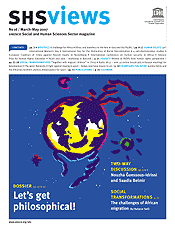| |
 |
 |
|
 |
 |
| SHSviews 16 |
| |
| UNESCO Social and Human Sciences Sector Magazine |
 |
| Dossier: Let’s Get Philosophical! / Two-way Discussion on Bioethics and Women’s Rights: Nouzha Guessous-Idrissi and Saadia Belmir / Social Transformations: the Challenges of African Migration, by Babacar Sall – March-May 2007 (English | Français | Русский) |
 |
 Taking responsibility Taking responsibility
1 February, 2007. UNESCO Headquarters is overrun by TV crews and correspondents busy reporting on the Intergovernmental Panel on Climate Change. Meeting at UNESCO, it has concluded that the evidence for global warming must henceforth be regarded as “unequivocal” and that human activity is “very likely” to blame.
Climate change is not a core issue for the Sector for Social and Human Sciences – although its consequences may impact on many of our areas of concern. It is, however, a physical manifestation of the essential practical and ethical unity of humankind. No doubt dealing with climate change will be costly, but the issue is not just one of resources. It entails taking responsibility, not just for our own actions, but for the very future of the planet.
It may not be fully appreciated that all questions of responsibility are ultimately ethical.
Quite naturally, the word “ethics” tends to be associated with only one aspect of the work of SHS: the ethics of science and technology, which has been our main strategic priority since 2002. Indeed, we work with countries from every region of the earth to strengthen their analytical capacity to respond to ethical questions arising from scientific and technological developments. This spring, the focus will be on Africa, as the International Bioethics Committee meets in Nairobi, Kenya, to discuss the African perspective on bioethics issues.
The field of ethics is, however, much broader. Since the essence of our work concerns human beings, nearly everything SHS does has a powerful ethical thrust.
This is especially evident in our work in the field of human rights. Our rights and our responsibilities towards others – including but not limited to respecting their rights – derive precisely from universal principles that make sense only in ethical terms. Similarly, ethical principles guide our programmes with regard to the advancement of human rights, to the promotion of gender equality, and to the struggle against discrimination.
The human rights dimension of poverty is of profound ethical significance. SHS activities to combat poverty from a human rights perspective coordinate and streamline UNESCO’s efforts to empower the poor to bring about positive changes in their lives.
This ethical approach also applies to the larger social transformations linked to globalization. The Management of Social Transformations (MOST) programme is designed to enhance the analytical capacity of Member States to understand and anticipate the implications of a fast-changing world for the most vulnerable and marginalized populations. In other words: to design ethical policies.
Similarly, the anti-doping programme is an integral part of our ethical mandate – the use of performance enhancing drugs directly undermines the ethical principles that underpin sports. With the entry into force in February 2007 of the International Convention against Doping in Sport, we have taken this ethical principle a step further.
And ethics, of course, has always been central to philosophy – an area in which we have a unique mandate as an intellectual organization. The dossier in this issue shows the real ethical implications, in the international context, of the philosophical questions we deal with. For without an ethical perspective, policy is ultimately rudderless. Not only do ethical and analytical capacities not conflict: each is indispensable to the other.
Pierre Sané
Assistant Director-General
for Social and Human Sciences
The main articles of SHSviews cover topical issues from March to May 2007:- Dossier: Let’s Get Philosophical!
UNESCO was responsible for instituting World Philosophy Day, now an event whose popularity is growing year by year. On this year’s International Women’s Day, 8 March, UNESCO is calling for a worldwide network of women philosophers.
This dossier, far from being an exhaustive account, gives an insight into an organization which, by providing an institutional response to a philosophical question, is itself a philosophical institution in many ways. More … [PDF]
- Two-way Discussion on Bioethics and Women’s Rights: Nouzha Guessous-Idrissi and Saadia Belmir
One chairs the International Bioethics Committee (IBC). The other is a judge, adviser to the Moroccan Minister of Justice, and the first woman from an Arab State to have been appointed to the International Committee against Torture. Both have fought for human rights for many years, each on the basis of her own history, convictions and personality. To mark International Women’s Day 2007, SHS Views interviews two eminent Moroccans: Nouzha Guessous-Idrissi and Saadia Belmir. More … [also available in PDF format]
- Social Transformations: the Challenges of African Migration, by Babacar Sall
In April, with the UNESCO Executive Board examining the first proposals of the working group on “African migration and development”, SHS Views is giving a column to writer Babacar Sall, editorial director at L’Harmattan publishing house, and teacher at the École des Hautes Études en Sciences Sociales (EHESS), in Paris, France. More … [PDF]
Also in SHS Views 16:
|
 |
 |
 Email this page Email this page  Printable version Printable version
|
 |
|
|


